on all orders over $100
on all orders over $100
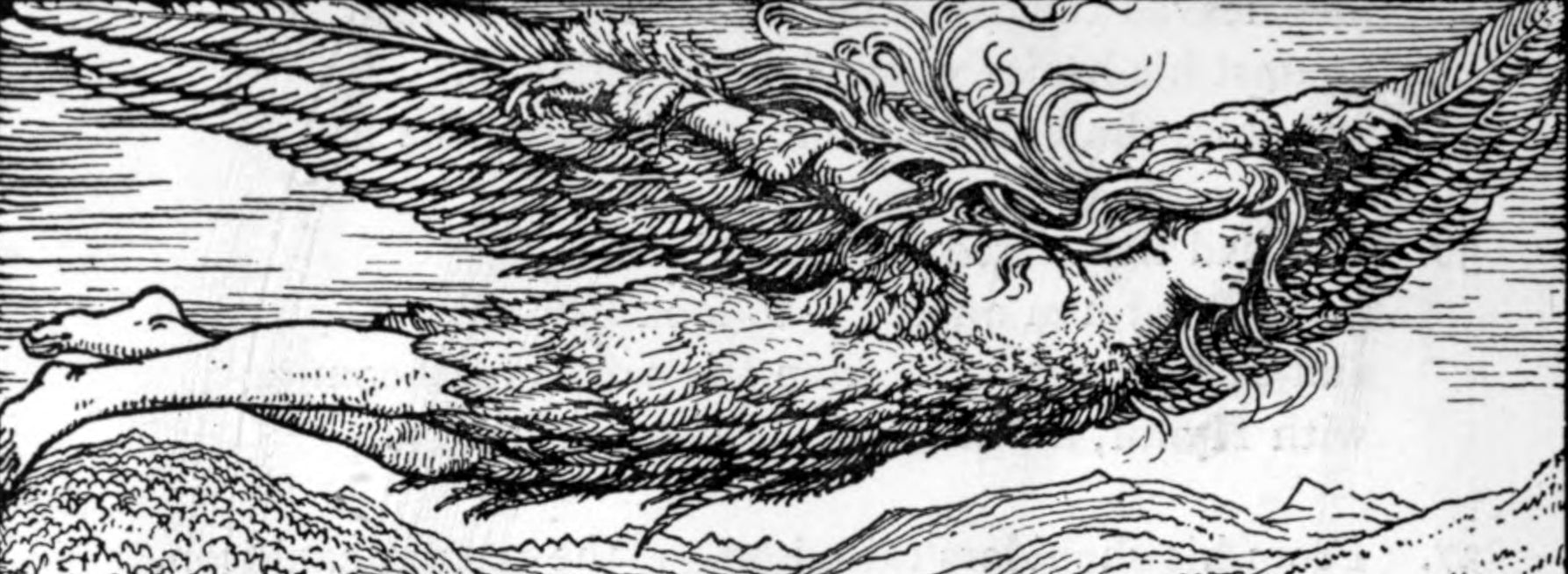
Loki was perhaps the most infamous of all the Norse Gods, often referred to as 'the trickster' he was notoriously mischievous. His relationship with the other Gods was somewhat complicated, he both helped and sabotaged them in equal measure depending on the source.
Although he lived amongst the Aesir and was accepted as one of their own, Loki was not one of them. He was born to the frost giants Fárbauti and Laufey who were both natives of Jotunheim. Odin adopted him as a child meaning he lived in Asgard for most of his life, and was like a brother to Thor.
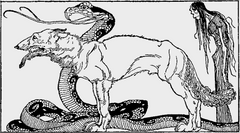
The children of Loki - Willy Pogany, 1920
With the giantess Angrboda he had three children, Hel, the goddess of death and ruler of the underworld, Jormungandr, the giant serpent who encircled the seas of Midgard and was prophesied to kill Thor during Ragnarok, and finally Fenrir, who was a giant wolf said to kill Odin in the same prophecy.
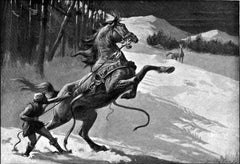
Loki and Svaðilfari - Dorothy Hardy, 1909
In a rather confusing turn of events Loki also gave birth to the eight legged horse, Slepnir, who belonged to Odin and had the ability to run over water and fly. Due to his shapeshifting abilities Loki had taken the form of a mare and coupled with the great stallion Svadilfari, meaning that he became the mother of Slepnir and birthed her himself.
As can be seen from his offspring Loki's allegiance to the Aesir was often cause for speculation during the sagas, however ultimately it was part of the prophecy of Ragnarok that Loki would side with the focus of chaos and help them in their battle against the gods. He would even be their captain, leading a ship called the 'nail ship' which would be made from human fingernails.
The saga of the kidnapping of Idun is a good example of the kind of role Loki usually played in the Norse stories and the problems he often caused for the other Gods. The saga begins with Loki, Odin and Hoenir on a quest travelling through a mountain range far from Asgard. This region was desolate and food was sparse, however the trio were fortunate in encountering a herd of Oxen, one of which they managed to capture and kill for food.
As they were cooking the Ox they began to realise that the meat was not cooking, when the three gods looked up the noticed a giant eagle sitting on the branch above them. The eagle said that he had bewitched the meat, and that it would never cook no matter how long they left it over the fire. He demanded that they gave him his share of the meat, only then would he lift the curse which he had placed upon it.
Begrudgingly the gods agreed and the eagle took the best cuts of the meat. Loki was angered by this and attempted to attack the eagle. He picked up a nearby stick and lunged at the eagle, however in his hungry and weary state he was not fast enough. The eagle dodged the attack and grabbed the branch in his talons, he then flew upwards rapidly whilst Loki was still holding on.
Loki was terrified and pleaded with the eagle to let him down, however it was at this point that the eagle revealed his true identity. He was Tjazi, a shape shifting giant, who had heard of the magical powers of Idun's fruits and wanted them for himself. He agreed to release Loki only if he would bring Idun and her apples to him in order to grant himself immortality.
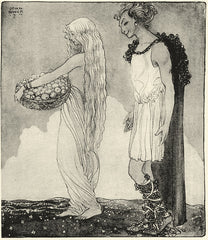
Loki and Idun - John Bauer, 1911
Once the three gods had returned to Asgard Loki went to Idun and told her of his travels, saying that he had found some new fruits, which were magical and even more powerful than the ones she already had. He offered to show them to her, and asked her to bring her own fruits to compare to the new ones. Intrigued, she followed Loki to a nearby woodland in search of the fruits, however once inside the woods the giant eagle swept her up in his talons and carried her away to the land of Thrymheim, an icy giants lair high in the mountains of Jotunheim.
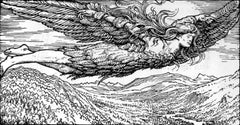
Loki's flight to Jotunheim - W. G. Collingwood, 1908
Before long the other gods began to notice the absence of Idun, without her magic apples they had began to turn frail and age rapidly, as this was the source of their immortality. They quickly suspected that Loki was behind it, as he so often caused trouble for them, and confronted him about it. After being threatened with pain and even death the trickster admitted what he had done.
The gods decided that he should be the one to fix the situation, so with the help of Freya's falcon feathers he was able to fly to Thrymheim to attempt to rescue the captured goddess. Upon his arrival he discovered that Idun was there alone, unable to believe his luck he acted quickly in order to take advantage is the situation. Idun told him that Thjazi had gone fishing and would be back soon, so Loki quickly used his magic to transform her into a nut and with her apples made haste to return to Asgard.
When the giant returned home to find her missing he was enraged and transformed into his eagle form in order to give chase to the escaping pair. As Loki was approaching the walls of Asgard the other gods looked on and noticed that the eagle was gaining on them at an alarming speed. In a panic they quickly began constructing a pile of wooden kindling on top of the walls. As soon as Loki passed the barrier they lit the walls ablaze and the flames shot into the sky. Thjazi was flying so fast that he was unable to stop in time and the giant flew straight into the fire and was burned to death.
This story was a good example of Loki's character in Norse Mythology, he often both helped and hindered the other gods and seemed to be motivated mainly by greed and self preservation. His blatant disregard for the wellbeing of his fellow gods was clearly displayed when he was willing to give away their powers of immortality, simply to save his own skin.
Loki also played a key role in the death of Baldur, one of the sons of Odin and his wife Frigg. Baldur was said the gentlest and most beloved of all the gods in Asgard, however he was prone to terrible nightmares. In order to investigate the cause of these malevolent dreams Odin travelled with him to Nilfheim to consult as sorceress about their problem. The seeress told them that Baldur would be killed, so upon their return to Asgard the gods decide they had to find a way to protect him from danger.
His mother, Frigg, set out to travel the nine worlds, asking every thing, object and lifeform to swear an oath that they would do no harm to her son. Once the gods, humans, giants, draweves and even the ground and elements themselves had agreed, she returned home, assured of her sons safety.
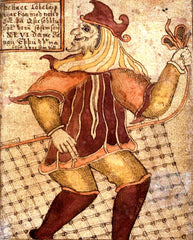
Loki with a fishing net - 16th Century Icelandic manuscript
To test his new powers the other gods decided to throw axes, fire arrows and sling stones at Baldur, who was unharmed by all of them as they simply bounced off him. When Loki witnessed these newfound powers that his half adopted brother had he was envious and began to scheme up a way to sabotage him. He shapeshifter into a female form and approached Frigg and asked her about the source of Baldur's newfound gifts. Frigg replied that she had asked everything in the nine worlds never to harm him, and when Loki pressed her she admitted that there was one thing that she had decided not to ask.
The thing in question was a rare type of mistletoe that grew close to Valhalla, Frigg had thought it too young to ask for the oath and decided it would not be a threat to her son. After collecting this information Loki promptly set off to collect the mistletoe and put his malicious plans into motion.
He brought the mistletoe back and approached Hod, Baldur's brother who was blind. When Loki enquired as to why he wasn't throwing things at Baldur like everyone else, Hod simply replied that he would not be able to see and that he also had nothing to throw. This was when Loki handed over a dart that he had fashioned from the mistletoe and positioned Hod in order to help him hit his target.
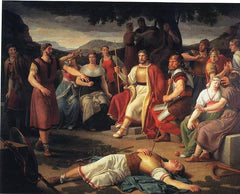
The death of Baldur - Christoffer Wilhelm Eckersberg (1817)
Whe Hod threw the dart it hit its mark and passed straight through Baldur, killing him instantly. The rest of the gods fell silent and then started to weep for their loss. Odin was particularly distraught with the death of his son, he knew that this was one of the first signs of the coming of Ragnarok as her had been told by a seer long ago.
Odin sent a messenger to the underworld realm to make a deal with Hel in an attempt to resurrect his fallen son. She agreed to do so, only if every single living creature would weep for his death simultaneously. After the news reached Asgard they contacted all of the nine realms and convinced them to weep for Baldur, and every living creature did, apart from one. The giantess, Tokk, who was actually Loki in disguise remained tearless and therefore Baldur was not returned to the realm of the living. In anger, and rather unjustly, the other gods executed Hod for his part in Baldur's death.
After they learned of Loki's role in the death of their beloved Baldur the other gods had had enough of his treachery and decided that something needed to be done. Loki needed to be punished. Upon realised their intentions Loki attempted to flee Asgard, however Odin's sight was far reaching and they managed to track him down and capture him.
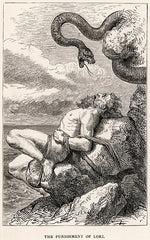
The punishment of Loki - Louis Huard
Loki was taken to a cave where he was tightly bound to a rock, using the entrails of one of his own sons for a chain. A poisonous snake was then placed above his head, and it slowly dripped poison onto Loki's face. Sigyn, he ever faithful wife, remained by his side throughout the ordeal and held up a bowl to attempt to catch the poison and protect her husband.

The binding of Loki - Mårten Eskil Winge, 1890
Every so often the bowl would become full and Sigyn would have to leave to empty it, whenever this happened the poison would hit Loki in the face and he would writhe in agony until she returned to protect him again. This was the fate that Loki would be doomed to until the prophecy of Ragnarok was fulfilled, where he would break free from his chains and join the battle against his fellow gods.
If you enjoyed our article or have anything to add please leave a comment below.
Check out some of our handmade viking seax and other armoury items.
Leave a comment